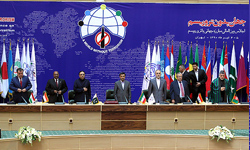|
The International Conference on Global Fight against Terrorism ended up work here in Tehran on Sunday after issuing a final statement. |

http://english.farsnews.com/newstext.php?nn=9004052538
The Tehran international anti-terrorism conference started work on Saturday with senior officials from at least 60 countries and representatives of several international bodies, including the UN, in attendance.
The event, arranged under the slogan of "A World Without Terrorism", was aimed at increasing international convergence and coordination in fighting terrorism.
According to the website of the conference, the full text of the final statement is as follows:
International Conference on Global Fight against Terrorism
Tehran, 25-26 June 2011
1) At the initiative of the Government of the Islamic Republic of Iran, the International Conference on Global Fight against Terrorism was held from 25 to 26 June 2011 in Tehran, Iran. Heads of States and governments from neighboring countries Afghanistan, Iraq and Pakistan as well as Sudan, Tajikistan, Mauritania and the Vice-President of Cuba and Ministers and other high-level delegates from 60 States, representatives of the United Nations (Officer in Charge of CTITF), the OIC, and other regional organizations as well as distinguished scholars and researchers and peace activists from all around the world participated in the Conference;
2) The participants expressed their deep appreciation for the Government of the Islamic Republic of Iran for its constructive and timely initiative in organizing the International Conference on Global Fight against Terrorism, and congratulated the Islamic Republic of Iran for its successful organization of the event. The participants stressed the high importance of such gatherings in further mobilizing political will and strengthening international capacities in countering terrorism at national and international levels;
3) The participants reiterated their unequivocal condemnation of all acts of terrorism in all its forms and manifestations, including State terrorism, economic terrorism wherever, against whoever and by whoever they may be committed. it was underlined that State terrorism has posed, for long, a real threat to the peace and stability of many nations across the globe through unlawful use or threat of force, aggression and occupation;
4) It was acknowledged that terrorism is a global challenge the elimination of which requires a globally approved approach under the United Nations' auspices and through participation of all responsible members of the international community. It also requires the use of all potentials of the competent regional and international organizations in order to promote cooperation and coordination in countering terrorism;
5) It was underscored that considering terrorism in a holistic and comprehensive manner and in all its aspects is vital. In this context, the importance of addressing the historical and the continuing root causes of terrorism, including foreign aggression and occupation, poverty and discrimination as well as interventionist policies by some States, was highlighted;
6) The participants underlined, as also reiterated by Iran's Supreme Leader, the need for providing a consensual definition for terrorism without prejudicing or affecting, in any manner, the recognized rules and principles of international humanitarian law. It was emphasized that legitimate struggles of peoples under colonial rule or foreign occupation for their inalienable right of self-determination should not be labeled as terrorism;
7) The importance of countering terrorism in a transparent, rule of law based, and non-discriminatory manner was emphasized. It was underlined that counter-terrorism measures shall be adopted and carried out in accordance with the Charter of the United Nations and international law, including international human rights and humanitarian law. The participants rejected selective or double-standard approaches in dealing with terrorism and terrorist groups and warned that such approaches could undermine international trust and cooperation in countering terrorism globally;
8) The distinctive role of the United Nations, especially the General Assembly, in building international consensus and promoting cooperation and coordination against terrorism was highlighted. In this context, the imperative of following the consensual approach in international counter-terrorism norm-making processes was underlined. Also the important status of the United Nations Global Counter-Terrorism Strategy and the need for its balanced implementation as well as its further reviews with a view to its strengthening was emphasized;
9) The participants underlined the need to extend cooperation and interaction among all States in countering terrorism, in all its aspects, at bilateral, regional and international levels. The participants reminded the responsibility of all States in taking the necessary measures to bring terrorists to justice, and requested all States to strengthen cooperation to this end;
10) The participants highlighted the unequivocal denunciation by all divine religions of acts of terrorism and indiscriminate violence against innocent people and the high importance these religions attach to human life and dignity as well as peaceful coexistence among nations. The participants rejected any vicious attempt to associate or attribute terrorism to a particular culture, religion or nationality and expressed their concern over certain circles' attempts to associate intolerance, extremism, terrorism and violence to religions, particularly Islam, and condemned any offensive or provoking act against Divine values and religious sanctities;
11) The participants expressed their sympathy with victims of terrorism, including State terrorism. The participants expressed their deep concern over excessive and/or disproportionate use of military force in the name of countering terrorism which has claimed the lives of an increasing number of innocent civilians, and stressed the importance of addressing the plight of these victims. The participants applauded the initiative of the Conference to commemorate the victims of acts of terrorism.
The participants welcomed the Islamic Republic of Iran's initiative to establish a standing headquarters for the Conference as a follow-up to further mobilize the international and regional political will and preserve the momentum in promoting cooperation and coordination in countering terrorism. In this context, the participants welcomed the offer made by the Republic of Iraq to hold the next Conference in Iraq at a date to be announced in due course.
